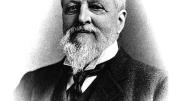"You gets no bread with one meat ball." In 1944 Hy Zaret and Lou Singer, of Tin Pan Alley, dusted off a largely forgotten old song, modernized its diction, changed the melody from bouncy to bluesy, and brought forth "One Meat Ball," a ballad about an underfunded diner and an intimidating waiter. Go to www.rhapsody.com/josh-white/josh-white-vol-5-1944 to hear singer Josh White tell the story:
A little man walked up and
down,
He found an eating place in town,
He read the menu through and through,
To see what fifteen cents could do.
One meat ball, one meat ball,
He could afford but one meat ball.
He told the waiter near at hand,
The simple dinner he had planned.
The guests were startled, one and all,
To hear that waiter loudly call, "What,
"One meat ball, one meat ball?
Hey, this here gent wants one
meat ball."
The little man felt ill at ease,
Said, "Some bread, sir, if you please."
The waiter hollered down the hall,
"You gets no bread with one meat ball.
"One meat ball, one meat ball,
Well, you gets no bread with one
meat ball."
The little man felt very bad,
One meat ball was all he had,
And in his dreams he hears that call,
"You gets no bread with one meat ball.
"One meat ball, one meat ball,
Well, you gets no bread with one
meat ball."
In a later recording, White adds "and no spaghetti" after the first "meat ball" in the last chorus, and many people know the song that way. "'One Meat Ball' was Josh's biggest hit by far," according to his biographer Elijah Wald, "and among the most popular songs of the 1940s folk revival." The Andrews Sisters cut a hit 78 of it, with "Rum and Coca-Cola." Even Bing Crosby sang it. But who knew that "One Meat Ball" got its start at Harvard?
George Martin Lane (1823-1897) was a member of the jolliest social clubs as a student at Harvard, yet managed his A.B. in 1846. He studied in Germany with no lingering pedantic effect, earning a Ph.D. from the University of Göttingen, and became professor of Latin at Harvard in 1851. He penned "The Lone Fish-Ball," first published in 1855, while he was living at "Clover Den," bachelor digs at what is now 29 Follen Street in Cambridge. Though a fish ball was a New England delicacy made of fish stock and potatoes fried and usually consumed at breakfast, "The Lone Fish-Ball" is identical to "One Meat Ball" in its existential argument.
"Many fables about the origin of this song have been told...," Lane's colleague Professor Morris H. Morgan later wrote, "but I know from Professor Lane's lips that it was based upon an adventure of his own. Arriving in Boston one day after a journey, he found himself hungry and with only 25 cents in his pocket. Half that sum he had to reserve to pay his carfare to Cambridge. With the rest he entered a restaurant, 'with modest face,' and ordered a half portion of macaroni. What followed is described, doubtless with humorous exaggeration, in the ballad itself."
"The Lone Fish-Ball" was a hit among Harvard undergraduates and remained at the top of their charts for decades. (The house on Follen Street entered Cambridge history as a center of hospitality, wrote Eliot professor of Greek William Watson Goodwin, where "the famous 'Roman Banquet' was given....")
During the Civil War, several of Lane's professorial colleagues turned his song into a fundraiser for Union soldiers. Folklorist Francis James Child '46, LL.D. '84, worked it up into a mock Italian operetta, Il Pesceballo, which was performed in Cambridge and Boston, setting the songs of his characters to a pastiche of melodies lifted from grand opera, beginning with a chorus sung to the tune of "La dolce aurora" from Rossini's Moses in Egypt and ending with the air to "Vieni!" from Donizetti's La Favorita. Composer John Knowles Paine arranged the recitatives and poet James Russell Lowell '38, LL.B. '40, LL.D. '84, provided a suitably absurd translation of Child's libretto into English.
When Lane retired in 1894, as Pope professor of the Latin language and literature emeritus, Harvard gave him an honorary degree and also a pension--the first ever bestowed by the University on a faculty member. The unexpected cash, Lane declared, relieved him from all pecuniary cares for the rest of his life.









